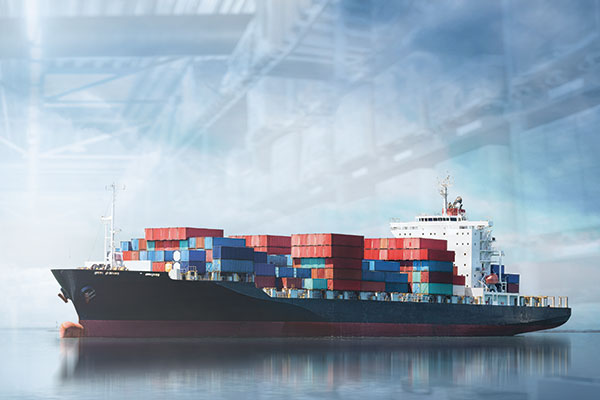Shippers might as well forget about planning for a “peak season,” industry analysts contend. Due to ongoing pressures from e-commerce and post-pandemic demand, ocean carriers are operating at crisis-driven velocity for the foreseeable future.
While there’s no shortage of demand from consumers, there continues to be shortages of labor, equipment and shipping capacity to meet their expectations. Supply chain disruptions, port congestion and rising shipping costs could continue to be challenges through the end of the year, a prominent ocean cargo expert
maintains.
Jon Monroe, president of Monroe Consulting, shares more views in this exclusive SCMR interview.
Supply Chain Management Review: Do you expect U.S. consumer demand to be high during Peak Season?
Jon Monroe: Do we really have a peak season? There seems to be no seasonality left. Just one big surge of containers. We have not left the “add to cart” mentality as more and more consumers continue to purchase online. Though as we re-open we may expect a shift in the type of product purchased, I do not see a norm developing for some time. At least not the kind of normal that we experienced pre-pandemic. It might be possible that this is the new norm which revolves around an ecommerce model. Add to this $1.5 trillion in pent up savings and the demand we see should carry us through 2021 at a minimum. So what is peak? It is the top. We are simple one long surge.
SCMR: What impact will inflation have on demand, if not controlled?
a
Monroe: In the short term, everyone expects some inflation. To the extent that it is short term, it will have no impact. If we move into 2022 and have significant inflation, everyone will pull back on spending which will be good for our economy. Our economy is simply too hot. It is driving supply chain costs through the roof and until there is a slow down of product moving from Asia to the US we will have no pricing relief.
SCMR: Will ocean carriers be able to sustain the current high rate structure?
Monroe: Unfortunately, yes. For many reasons. 1) they have learned how to manipulate space through blank sailings to keep capacity below demand. 2) The cost of operating vessels has gone up. Charter rates are more than double, and carriers have purchased more equipment and, 3) most importantly, the carriers are enjoying a time when they are making money. The old market share model that carriers pursued is all but dead.
SCMR: Do you expect shippers to leverage volume for favored status?
Monroe: No, carriers do not care about volume. It is all about getting the rates to a sustainable and profitable level. We will never return to the days of old. Carriers walked away from a number of BCO contracts this year.
SCMR: What about service? Can carriers deliver on their promises, or are they overwhelmed?
Monroe: Well, carriers are overwhelmed. That does not mean they cannot offer a service. That simply is not their priority now.
SCMR: How likely will shippers opt for air cargo if ocean carriers can’t manage schedule integrity?
Monroe: Many shippers are already opting to move their product via air. The brand retailers are especially keen to do this and it is being done this very minute. Not all companies can afford the price of airfreight. It depends upon the value and margin of goods. Importers are now prioritizing their product based upon profitability and out of stock items. As premium services increase in price, air is an easier option as the price differential is not so great. $17k for a 40’ container from China base ports to Houston. Who would have thought?
SCMR: Will global supply chains remain clogged for the rest of the year? What is the solution?
Monroe: Yes, expect the congestion we see to worsen as time passes. The recent crisis in Yantian port will drag this out for months. The backlog is severe. Add 4 to 6 weeks to your lead time, ship early and supplement your ocean with air.
SCMR: Ports and terminals are congested too…should shippers avoid bottlenecks on the U.S. West Coast by sourcing from the East and Gulf Coasts?
Monroe: In some cases yes. But Southern California ports will improve. But they will also get worse. We must remember the ILWU negotiations are coming up next year. Expect a slowdown.
SC
MR


Latest Supply Chain News
- Despite American political environment, global geopolitical risks may be easing
- Joseph Esteves named CEO of SGS Maine Pointe
- Employees, employers hold divergent views on upskilling the workforce
- April manufacturing output slides after growing in March
- Q1 sees a solid finish with positive U.S.-bound import growth, notes S&P Global Market Intelligence
- More News
Latest Podcast

 Explore
Explore
Business Management News
- Joseph Esteves named CEO of SGS Maine Pointe
- Employees, employers hold divergent views on upskilling the workforce
- April manufacturing output slides after growing in March
- Q1 sees a solid finish with positive U.S.-bound import growth, notes S&P Global Market Intelligence
- 6 Questions With … Sandeep Bhide
- MIT CTL offering humanitarian logistics course
- More Business Management
Latest Business Management Resources

Subscribe

Supply Chain Management Review delivers the best industry content.

Editors’ Picks





